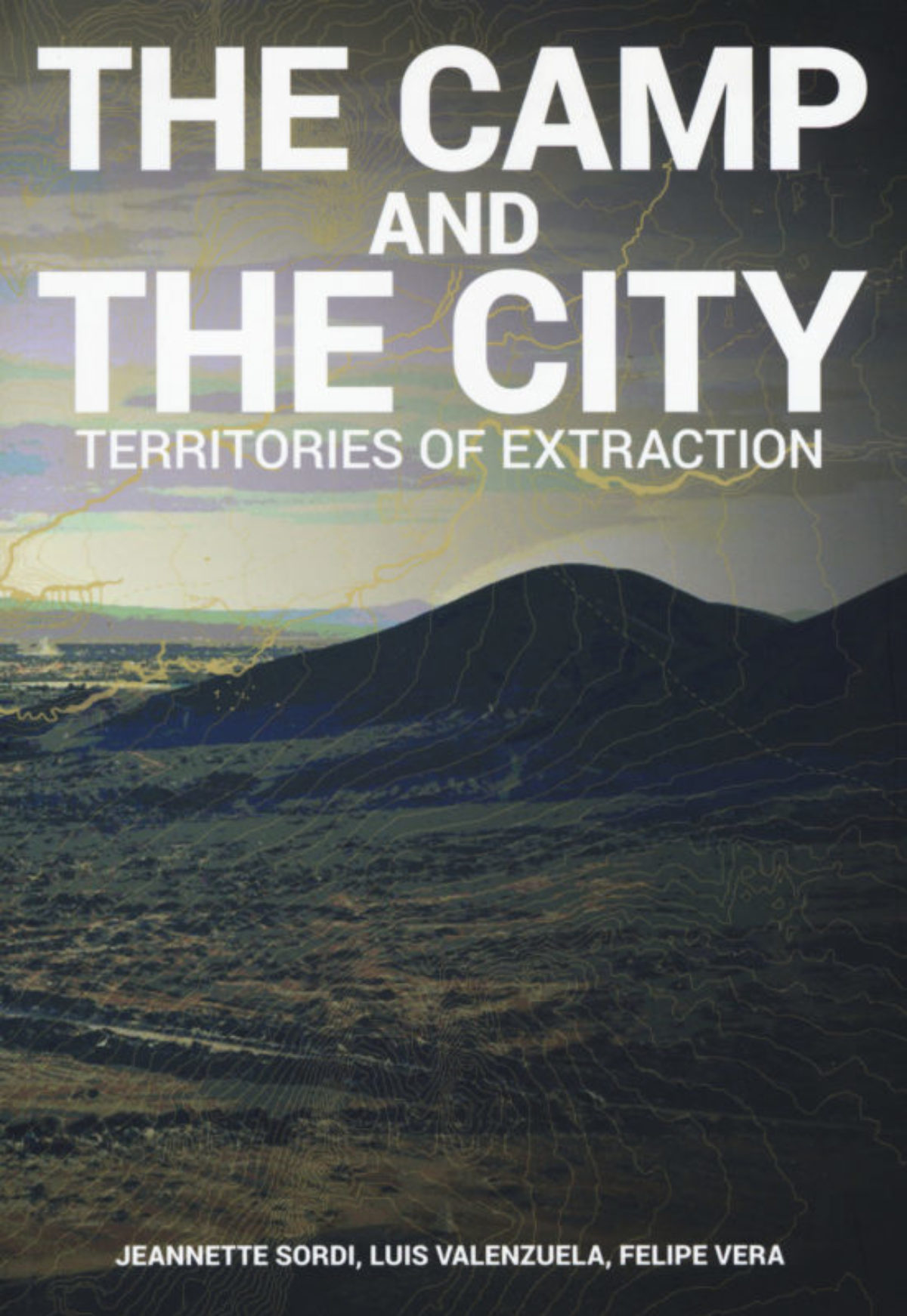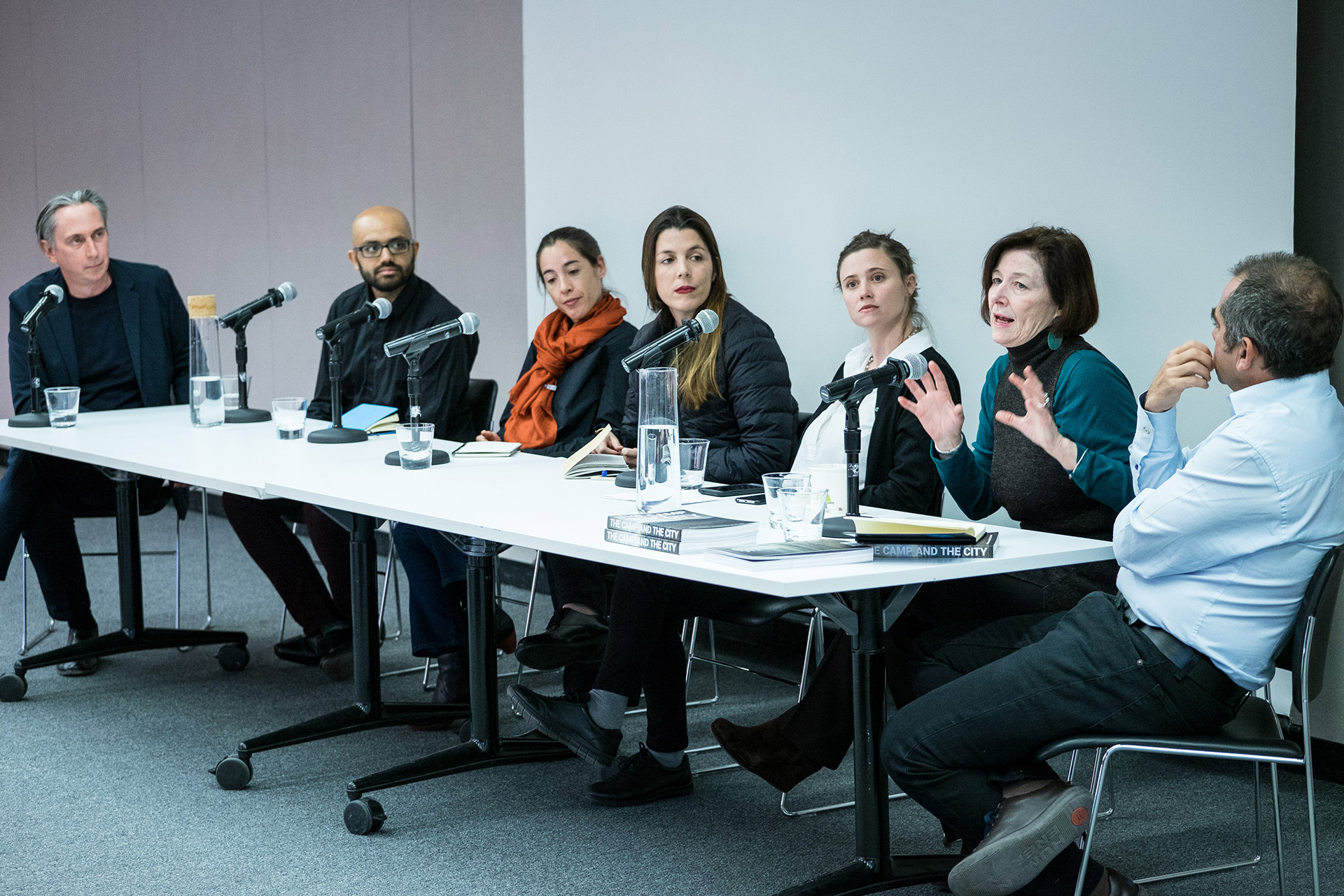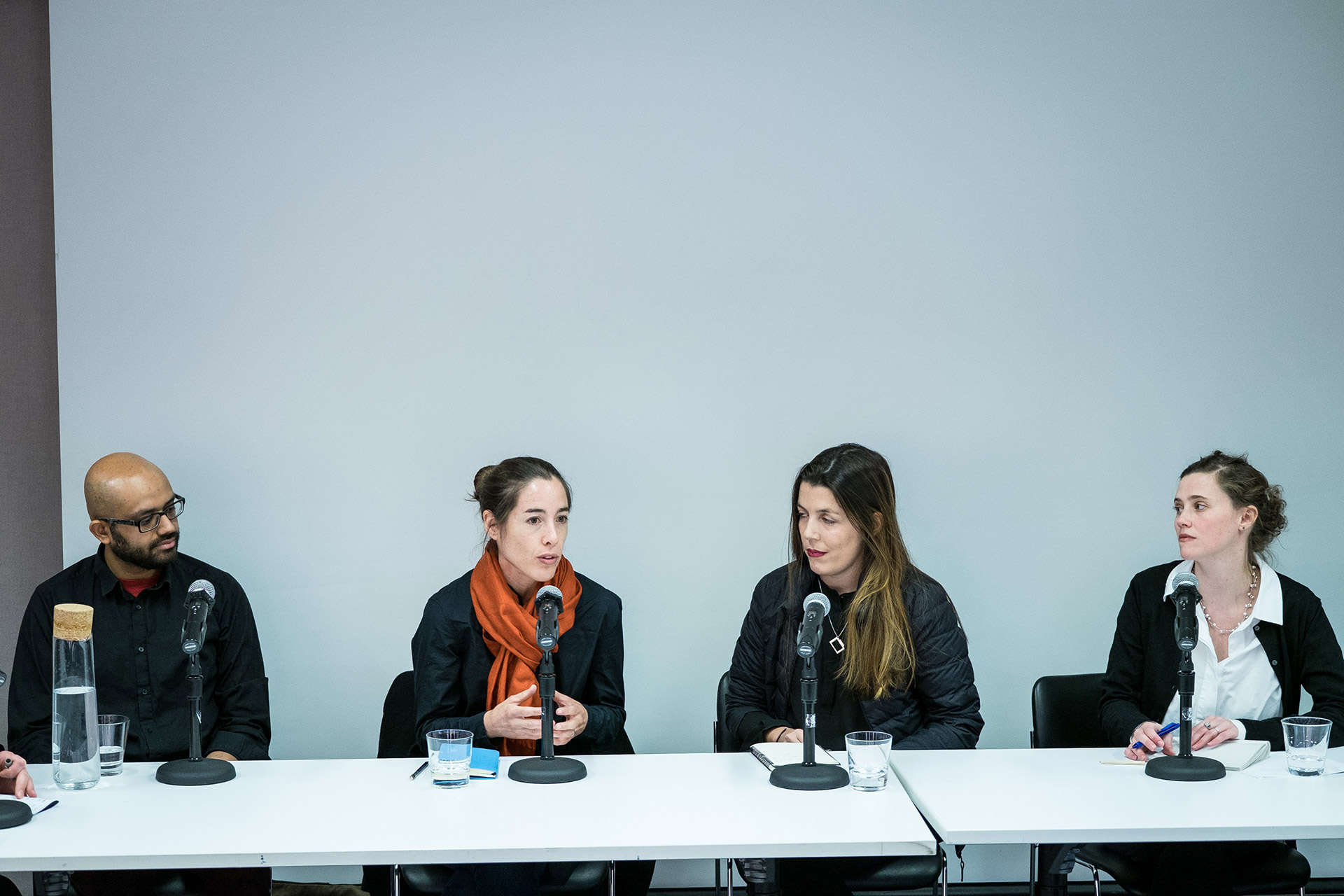The Camp and the City: Territories of Extraction

Please join editors, Jeannette Sordi, Luis Valenzuela, and Felipe Vera for a discussion of their new book The Camp and the City: Territories of Extraction. They will be joined in a panel discussion with contributors, Maria Ignacia Arrasate, Sourav Kumar Biswas, and Agustina Gonzáles Cid.
Urbanization metabolizes territories surrounding cities as well as territories that are located far beyond the centers themselves and provide the needed resources and goods. Landscapes of extraction are probably one of the most evident examples of this: whole regions are exploited for their resources to ensure the development of others. However, while it is becoming evident that these territories could be considered as part of the urbanization process itself, they are still very marginal in the agenda of urban designers, planners, regional administrators, and political institutions. Territories of extraction are not paid enough attention as places for living themselves – they are in a way the negative of cities: they are what ensures the development, prosperity, and consolidation of cities, but are themselves the emblem of deployment and precariousness.
The Camp and the City book aims to articulate a discussion about territories of extraction in order to set up concepts and provide a general overview of their common challenges throughout different landscapes. Calama – the most important mining cluster in Chile and one of the most important hubs for copper extraction in the world – is presented as a case study in order to generate a more specific and evidence-based discussion, offering the ground for the development of a more projective critical view.
Jeannette Sordi, editor
Jeannette Sordi is Associate Professor of Landscape and Urbanism at the Design Lab of Universidad Adolfo Ibanez, Santiago, Chile. She holds a PhD from the Polytechnic School of the University of Genoa (2014) and has been DAAD post-doctoral research fellow at Leibniz Universität Hannover (2014) and PhD Special Student at the Harvard Graduate School of Design (2011- 2012). Her research focuses on the investigation of recycling strategies for architecture, landscape, and urbanism and on the development of planning instruments and devices based on recycling, landscape, and ecology. She is the author of the book Beyond Urbanism (List, 2014) that reassembles the origins and theories of Landscape Urbanism, and co-editor of Andrea Branzi. Ten Humble Suggestions for a new Athens Chart (Arq, 2015).
Luis Valenzuela, editor
Director for the Center of Territorial Intelligence and academic for DesignLAB at Adolfo Ibañéz University, professor at the school of business at Adolfo Ibañéz University and associated researcher at the Center of Conflict and Social Cohesion, COES. He holds an Architecture diploma and a Master in Architecture from Chile’s Catholic University and a Doctor of Design from Harvard’s Graduate School of Design.
In 2014 and 2015 he was guest professor at Harvard’s Graduate School of Design. In 2011 he founded the Center of Territorial Intelligence and worked as sub-director for the school of design. From 1997 to 2011 he was academic at the School of Architecture, Design and urban Studies of Chile’s Catholic University, where he leaded the urbanism department for the School of Architecture and created the Master in Urban Project program. He was also academic of the Master in Building Administration at the School of Engineer at Chile’s Catholic University. He was executive director of extension and external services at School of Architecture, Design and urban Studies and director of the Cities Observatory, both at Chile’s Catholic University.
Felipe Vera, editor
Architect, Universidad de Chile (2009). MDeS in Urbanism, Landscape & Ecology from Harvard Graduate School of Design (2013). Professor and co-director of the Center for Ecology, Landscape and Urbanism at the UAI DesignLab in Chile and Member of the Initiative for Sustainable and Emergent Cities at the Inter American Development Bank. He is editor of ‘Kumbh Mela: Mapping The Ephemeral Mega City’ (2014), ‘Andrea Branzi: Ten Recommendations for a New Athens Charter’ (2015) ‘Rahul Mehrotra: Dissolving Thresholds’ (2015), Ephemeral Urbanism (2016) and curator of the ‘Radical Temporalities’ Pavilion at the Shenzhen Biennale of Architecture and Urbanism (2015) awarded with the International Academic Award, and ‘Ephemeral Urbanism Cities in Constant Flux’ Pavilion at the Venice Biennale (2016). Felipe Vera was a faculty at the Department of Urban Planning and Design at Harvard University.
Maria Ignacia Arrasate, contributor
María Ignacia Arrasate is a Research Associate at the Zofnass Program for Sustainable Infrastructure at Harvard’s Graduate School of Design (GSD). Her research at Harvard is focused in promoting sustainable practices and improving resilience in large infrastructure projects across Latin American. She recently graduated from the Master in Design program at GSD, focusing in the field of designing resilient projects and implementing public policies for post-disaster recovery. Before coming to Harvard, she worked as a Minister Advisor in the Chilean Reconstruction Program led by the Chilean government to recover thousands of houses and infrastructure, which were severely damaged after the earthquake and tsunami that partially devastated the South of the country in 2010. She has published several articles related to the experience in disaster recovery learned in Chile. Her career began in the construction sector as an architect practitioner, working for several years in project management and design, addressing different project scales, from individual housing to master plans. During her years in Chile, she combined her professional practice with academic work, giving courses both in Universidad Católica de Chile and Universidad del Desarrollo. She holds a professional degree in architecture from the Pontificia Catholic University of Chile, as well as a Master’s in Advanced Architectural Design from Columbia University.
Sourav Kumar Biswas, contributor
Sourav Kumar Biswas is a research associate for Neil Brenner and Rahul Mehrotra at Harvard University Graduate School of Design. He is a Landscape Architecture graduate from Harvard University with a professional degree in Architecture from the University of Texas at Austin. His professional career in design and planning spans the cities of Mumbai, Copenhagen, Dallas, Austin, Doha, Auroville, Kolkata, and Cambridge working in diverse firms like Corgan Associates, Serie Architects, and SLA. He has complemented his professional experience with community outreach, curatorial and research experiences working with the BMW Guggenheim Lab and Observer Research Foundation in Mumbai, Interboro Partners in Cambridge, and the Zofnass Program for Sustainable Infrastructures at Harvard. He has also been a visiting faculty at the KRV Institute of Architecture in Mumbai. Sourav’s research focuses on the socio-ecological impact of extended urbanization on the landscape and its people, with a particular interest in community management of blue-green infrastructure and the intersection of working landscapes with land-water conservation. He is applying an understanding of land-water linkages and land-management frameworks towards integrated conservation goals for growing urban regions such as the Kolkata Metropolitan region and Pueblo County in Colorado. His project on agricultural landscapes around Mexico City received Analysis and Planning honor awards by the American Society of Landscape Architects and Boston Society of Landscape Architects. His current research project identifies urban governance challenges faced by transitioning settlements in India. A spatial deconstruction of Census datasets and global datasets is utilized to identify radical shifts in livelihoods within a highly populated agrarian field and rapidly transforming areas outside of large urban centers.
Agustina González Cid, contributor
Agustina González Cid is a licensed architect and urbanist interested in a transcalar approach to territorial design. She holds a Master of Science in Architecture and Urban studies from MIT, funded by a Fulbright Scholarship. She also holds a diploma in Architecture and Technology from Torcuato Di Tella University and a professional degree of Architecture from the National University of Rosario where she teaches since 2010. González Cid is founder principal of I+GC [ar], developing projects that range from small furniture to housing and large-scale territorial designs. Her built work and competition submissions have been published in different national and international media. González Cid’s current research is focused on analyzing the urban condition of productive territories and designing new territorial logics based on the interaction between human actions and ecology. In 2015, she was funded by MISTI (MIT International Science and Technology Initiatives) to do research on copper mining in Chile at the Center of Territorial Intelligence at Adolfo Ibáñez University (Santiago, Chile). She now works at ECOM (Metropolitan Coordination Entity for the Rosario Metropolitan Area, Argentina) where she is in charge of establishing and designing productive peri-urban areas and their relation to other land uses of twenty municipalities and communes of the Rosario metropolitan region. She also teaches and conducts research towards the creation of an Atlas of Argentina‘s productive territory at Torcuato Di Tella University.
The Camp and the City: Territories of Extraction is edited by Jeannette Sordi, Luis Valenzuela, Felipe Vera, with essays by Pablo Allard, Maria Ignacia Arrasate, Mariana Barrera, Sourav Kumar Biswas, Diane Davis, Agustina González Cid, Rania Goshn, El Hadi Jazairy, Rahul Mehrotra, Flavio Sciaraffia, Jeannette Sordi, Ricardo Truffello, Luis Valenzuela, Felipe Vera.
This event is co-sponsored by the Department of Urban Planning and Design at the GSD and the David Rockefeller Center for Latin American Studies.
Anyone requiring accessibility accommodations should contact the Public Programs Office at (617) 496-2414 or [email protected].
#GSDEVENTS

